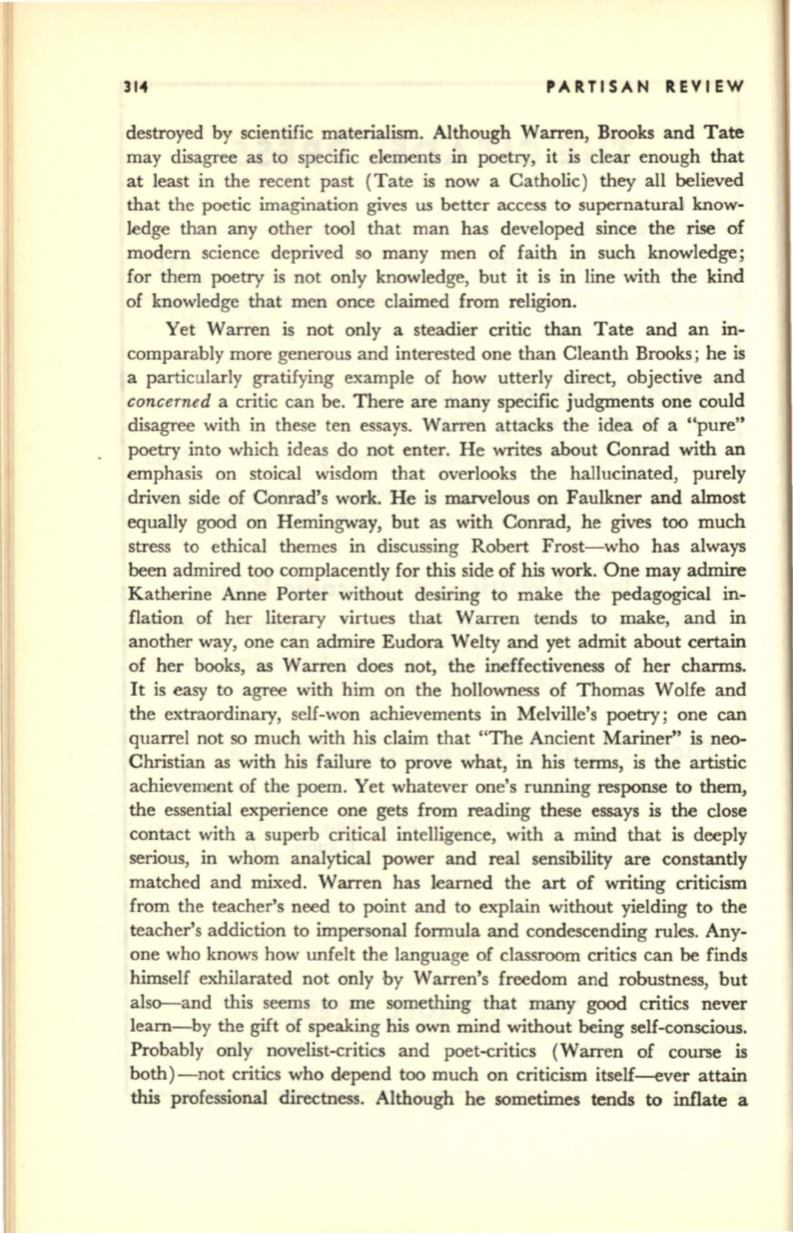
314
PARTISAN REVIEW
destroyed by scientific materialism. Although Warren, Brooks and Tate
may disagree as to specific elements in poetry, it is clear enough that
at least in the recent past (Tate is now a Catholic) they all believed
that the poetic imagination gives us better access to supernatural know–
ledge than any other tool that man has developed since the rise of
modern science deprived so many men of faith in such knowledge;
for them poetry is not only knowledge, but it is in line with the kind
of knowledge that men once claimed from religion.
Yet Warren is not only a steadier critic than Tate and an in–
comparably more generous and interested one than Cleanth Brooks; he is
a particularly gratifying example of how utterly direct, objective and
concerned
a critic can be. There are many specific judgments one could
disagree with in these ten essays. Warren attacks the idea of a "pure"
poetry into which ideas do not enter. He writes about Conrad with an
emphasis on stoical wisdom that overlooks the hallucinated, purely
driven side of Conrad's work. He is marvelous on Faulkner and almost
equally good on Hemingway, but as with Conrad, he gives too much
stress to ethical themes in discussing Robert Frost-who has always
been admired too complacently for this side of his work. One may admire
Katherine Anne Porter without desiring to make the pedagogical in–
flation of her literary virtues that Warren tends to make, and in
another way, one can admire Eudora Welty and yet admit about certain
of her books, as Warren does not, the ineffectiveness of her charms.
It is easy to agree with him on the hollowness of Thomas Wolfe and
the extraordinary, self-won achievements in Melville's poetry; one can
quarrel not so much with his claim that "The Ancient Mariner" is neo–
Christian as with his failure to prove what, in his terms, is the artistic
achievement of the poem. Yet whatever one's running response to them,
the essential experience one gets from reading these essays is the close
contact with a superb critical intelligence, with a mind that is deeply
serious, in whom analytical power and real sensibility are constantly
matched and mixed. Warren has learned the art of writing criticism
from the teacher's need to point and to explain without yielding to the
teacher's addiction to impersonal formula and condescending rules. Any–
one who knows how unfelt the language of classroom critics can be finds
himself exhilarated not only by Warren's freedom and robustness, but
also--and this seems to me something that many good critics never
learn-by the gift of speaking his own mind without being self-conscious.
Probably only novelist-critics and poet-critics (Warren of course is
both) -not critics who depend too much on criticism itself--ever attain
this professional directness. Although he sometimes tends to inflate a


